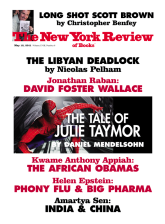In response to:
Daniel Bell (1919–2011) from the April 7, 2011 issue
To the Editors:
Like Mark Lilla, I admired Daniel Bell’s public sociology and felt at once charmed and stimulated by his dialectical acuity in argument [NYR, April 7]. What Lilla calls Bell’s “negative epiphany,” his refusal to advance a comprehensive theory of society in the manner of his nineteenth- century predecessors, surely deserves praise. Yet methodological pluralism was already available in the social philosophy of John Dewey, whose radically democratic insights Bell likewise refused to advance, and Max Weber, whose critique of absolutism in politics recognized, as Bell’s did not, the importance of faith, passion, and commitment. As Weber wrote: “An ethic of ultimate ends and an ethic of responsibility are not absolute contrasts but rather supplements, which only in unison constitute a genuine man—a man who can have the ‘calling for politics.'”
In the 1950s, a vulgar pluralism in the social sciences manufactured an “orthodoxy,” to borrow Lilla’s term, that suppressed reality. The civil rights movement, about which Bell had little to say, exposed a social system that did not obey his tripartite division of economics, politics, and culture. “His perspective on modern ideology was distinctly Jewish,” Lilla writes. But the movement’s transformational psychodynamics and religious motivation, wide enough to engage young Jewish intellectuals in constructive political action, stood Bell’s conception of ideology on its head.
Conversations with Bell about politics and ideology qualified my respect for him with a suspicion that his early conversion had imposed its own limits. Marxism has contributed a long footnote to American social thought. Yet Bell seemed to imagine it as a fearsome demon. I share Lilla’s appreciation for his essay on Georg Lukács, for example, but I can think of many subjects in 1971 that would have counted for more than diagnosing the fantasies and pathologies of a dwindling band of powerless neo-Marxists. The next quarter-century belonged to the conservatives.
That may not have been obvious to Lilla when he met Bell at Harvard in the 1970s, but by the 1990s, when I attended college, Marxism had become a harmless academic exercise, technology had supplanted radical political consciousness, and “the occult power of political messianism” had been ridiculed by the cynicism that remains today the greater danger. If only our wars were fought with ideas, rather than drones, then, indeed, Bell’s thought would be both contemporary and modern.
John Summers
Cambridge, Massachusetts
Mark Lilla replies:
John Summers is wrong on some small things, but on one big thing he makes an important point. Yes, it is true (as Daniel Bell was the first to say) that Weber and Dewey were early pluralists who opposed reductive social theories, but neither of them got as far as Bell did in exposing how the principles governing the different spheres of social life could actually come into contradiction, or how cultural modernism in particular posed a challenge to the traditional norms of democratic governance and capital accumulation.
And I really don’t see how Summers can say that Bell was blind to the motivations, particularly religious, behind the social movements that began in the Sixties. The Cultural Contradictions of Capitalism, which was published in 1976, is a book-length meditation on just that development; it can be criticized for being too rooted in the contemporary political context, but not for ignoring it.
But Summers’s larger point, about the relation between the history of Western Marxism and American history, is an important one to make. The “orthodoxy” of the Fifties that he mentions was an American democratic one, and the political movements that overturned it were also homegrown. This was a little hard to see at the time, not only for cold war liberals like Bell, but also for many in the student and Black Power movements who steeped themselves in Marxist theory and shilled for third-world oppressors who cast themselves as revolutionary liberators in the tradition of 1789, 1848, and 1917.
This was not a new development. From the moment the United States ventured abroad in the First World War, then became a world power in the Second, and extended its influence throughout the cold war, American intellectuals and politicians began thinking about their provincial and inward-looking country in terms of Weltgeschichte (which, it must be admitted, basically meant modern European history). It was a time when nonsensical questions like “Why is the there no socialism in the United States?” made sense to a lot of people.
In retrospect, we can now see that the elaborate democratic folk ritual that got played out in the Sixties and Seventies in America had little to do with Weltgeschichte and everything to do with how we see ourselves as a nation. The paradox, of course, is that while the United States’ impact on the world has grown enormously since that time, its intellectual and political classes have become less engaged with ideas and literatures beyond our borders, less familiar with foreign cultures, and less informed about world events. The results are before us. It may not occur to someone who attended college in the 1990s that things once were different, but they were. I’ll retain my nostalgia for that period, thank you very much.
This Issue
May 12, 2011



